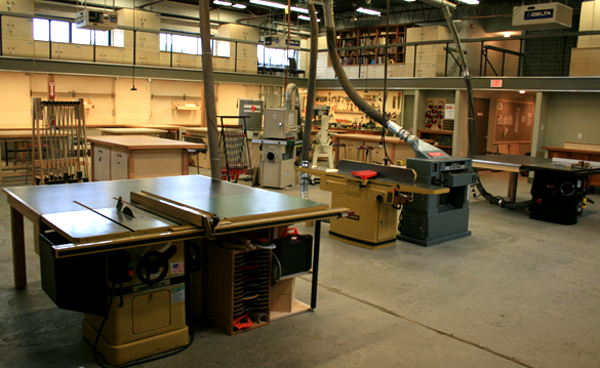Co-working for Carvers
by Matt Bevilacqua
Walk into the front office of Philadelphia Woodworks and you will come across shelves full of handmade bowls, clocks, candlesticks, chessboards, reusable wine corks and even kaleidoscopes. All are made from wood, and not by professionals.
Tucked into an Umbria Street warehouse at the foot of Manayunk’s Germany Hill, Philadelphia Woodworks functions as a sort of co-working space for carvers. Not only does it hold classes and private lessons, but it also allows amateurs and hobbyists alike to join as members and take advantage of its plentiful space and equipment.
“This is a gym for woodworking,” founder Michael Vogel says. He gestures to the biggest of the space’s three rooms, which rings with the sound of saws.
Members can drop in whenever they like to work on projects, and Vogel keeps late hours —until 10 p.m. Tuesday through Thursday and until 6 p.m. on the weekends—to accommodate people with day jobs. Unlimited access to the tables, lathes and saws costs $129 per month, or $20 an hour for non-members.
Vogel, 36, started Philadelphia Woodworks in 2011 after spending 10 years in the financial sector. Looking for more fulfilling work, the Penn architecture grad at first sought to develop what had been his hobby at established furniture factories, but they rarely take on inexperienced workers.
That’s when he got the idea to start his own space. At the time, only three such membership-based, open-access woodshops existed in the country.
“All three had the same advice, which was, ‘You have to have a retail store to make all your money and subsidize the fact that you want to have this fun experience in the shop where users come and go,’” Vogel says.
Instead, he aimed to support his business by bringing together a community of learners and makers. Today, Vogel earns about 40 percent of his revenue from classes and another 40 percent from memberships. He stays in touch with the other shops, and says that they have taken a page from his book by ramping up the educational and co-working sides of their own operations.
“Originally, it was a mentor-ish relationship, and now they are peers,” Vogel says.
Vogel does sell lumber, prioritizing supply companies that cull stock from trees that fall down naturally—after storms, for instance.
For customers, though, the shop tends to have both a concrete and an abstract appeal. Vogel talks of members who did woodworking with their parents as children and rediscovered the craft at his space, with the added tint of nostalgia.
Gloria Becker is one such customer. “My father had a shop in the basement, but he would never let me touch any tools,” she recalls.
It wasn’t until two years ago, when her wife encouraged her to find a hobby, that Becker, 53, came across Philadelphia Woodworks. She started at a women-only intro class, learning how to make cutting boards, and has since become a monthly member.
“I could never set up a shop at home,” the Roxborough resident says.
Ted Feldman, 61, was one of the shop’s earliest members. A physician assistant in orthopedics, he calls woodworking “a natural extension of my professional interests.”
“During the week, I work on bones, and during the weekend, I work on wood,” he says.










